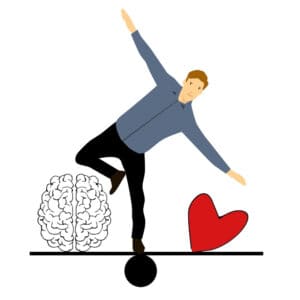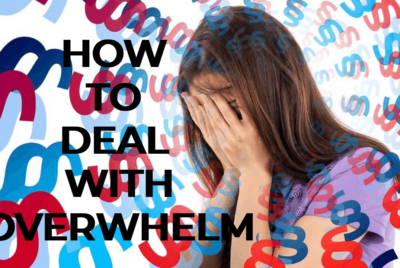Thinking and Our Thoughts

It starts with our thoughts. Our thoughts can improve every area of our life, our personal experience, our relationships, our professional careers, and our health. And it can also destroy them.
Consciously or unconsciously, every thought we think is translated by our brains into electrical impulses that direct our brains’ control centers.
Our way of thinking, the thoughts we think of from the time we wake up in the morning to the time we sleep at night is critical to the kind of life we have, to the emotions we feel, to the dreams we want to fulfill, to the life we want to live. Our thoughts control every action, emotion, every feeling, every moment.
Our thoughts can make or break us. So we need to know what kinds of thoughts are good or bad for us. Identify them and face them head-on. In her book Who Switched Off My Brain, Dr. Caroline Leaf gave us what she calls the dirty dozen of toxic thinking.
Dirty Dozen of Toxic Thinking
1. Toxic Thoughts
Analyzing and addressing our thoughts is critical to conquering bad habits and behaviors that deter us from being better or living the life we want.
Identify toxic thoughts early, throw them out before they take hold and become permanent in your mind.
2. Toxic Emotions
Emotions and thoughts are inseparable and linked with each other.
Love and fear are only two types of emotions. Other emotions such as patience, joy, trust, caring, peace, contentment, kindness, gentleness, come out of love.
Depression, confusion, jealousy, bitterness, anger, hatred, rage, anxiety, and guilt stem from fear.
Thought formation and emotional expression are tied to a specific flow of chemicals in our bodies. Toxic thoughts destabilize and disturb our brain’s psychosomatic network, which harms our emotions and intellect.
3. Toxic Words
The words we speak come from our thoughts inside our brains. What we do or say must reflect the way we think. If we are dishonest or lack integrity, it results in stress and will affect how information is processed, and memories are built.
Negative words are harmful because our minds formed the toxic thought, meditated, and spoke them, reinforcing them in our minds and creating a negative stronghold, causing stress. Stress chemicals flow to our brain, affecting our thinking, intelligence, and our bodies.
When you hear or say toxic words, turn it into a favorable situation by rechecking our motives, attitudes, and changing our words. Replace negative words into positive ones.
Words kill or give life: they’re either poison or fruit – you choose. Proverbs 18:21
4. Toxic Choices
We have the gift of choice and we make choices based on our thoughts. So we have to guard against toxic thoughts so as not to make toxic choices.
5. Toxic Dreams
Our dreams are a way for us to sort out our emotions and thought life. Dr. Caroline Leaf says that strong emotions that are not processed thoroughly are stored on the cellular level. At night, or whenever you dream, stored information releases and bubbles up into consciousness like a dream. The content of our dreams reaches our awareness as stories, complete with plot and characters are drawn in the language of our everyday awareness, though not always in a way we may immediately understand.
The dream state allows our psychosomatic network to rebalance itself and prepare us for the demands of our waking life.
It is, therefore, important to remember your dreams and use them as part of the detoxifying process. Write them down, revisit them, understand their meaning. Find those hidden pearls of wisdom. Learn from our dreams and find the revelations to our life
6. Toxic Seeds
Toxic seeds grow roots, embed themselves, and inhibit the growth of love, life, and happiness in our lives.
Let’s dive on the seed of unforgiveness. Forgiveness is a choice. It enables us to release the toxic thoughts of hate, anger, shame, grief, regret, guilt.
When we don’t forgive, we hold on to toxic thoughts and emotions, which causes stress chemicals, raises stress hormones leading to an increase in blood pressure and heart rate. A chronic and longterm stress response can make us sick physically and mentally.
We can change the way we think of past hurts by repentance and forgiveness.
Catherine Ponder, “When you hold resentment toward another, you are bound to that person or condition by an emotional link stronger than steel. Forgiveness is the only way to dissolve that link and get free.”
7. Toxic Faith
Scientific research has shown that prayer and activities that develop our spiritual life increase the brain’s frontal lobe activity, thickness, intelligence, and overall health.
 8.Toxic Love
8.Toxic Love
Love activates the pleasure-reward system in the brain, and the neurotransmitter dopamine, which helps us focus, increase attention, and stay healthy. So when our thinking becomes toxic, they turn the good into bad and love into addictions.
Research also shows that the heart considers and thinks about the information from the brain. It is not just a pump, but it is our body’s most robust biological oscillator. The heart can pull other body systems so that when our heart is at peace and filled with love, our body feels love and peace. When our thought life is filled with toxic emotions, our hearts are heavy, and so is our body and mind.
9. Toxic Touch
Touch is described as one of the essential elements of human development, a critical component of health and infant growth, and a powerful healing force.
Human touch releases natural chemicals that increase feelings of happiness and well-being.
Rene Spitz discovered in his study back in the 40s about babies dying from touch-deprivation. The brain will rewire negatively when our skin, a large organ full of nerves do not get the affectionate touch and affect brain signals.
10. Toxic Seriousness
Hates to have fun and despise others who have fun.
Many studies show laughter is the best medicine. When you laugh, there is an instant release of feel-good chemicals that reduce stress hormones and boost our immune system.
Humor gets both sides of our brain to work together, which is key to releasing potential. Studie suggests that laughter helps to increase the flexibility of thought. Laughing equals aerobic exercise in boosting body-mind health.
Having fun through play and laughter is the cheapest and most effective way to control toxic emotions, thoughts, and stress reactions.
Humor can change our perspective in an instant. Our mood changes, and the way we look at things shifts from the negative, sad to the positive, quickly.
11. Toxic Health
Hates exercise and a healthy lifestyle.
Exercise is not only good for our bodies but to our brain health as well. Exercise helps generate brain cells and stimulates the production and release of BDNF( neuronal growth factor), which plays a vital role in changing thinking.
There are many kinds of aerobic exercise, but what is important is to find the one that we like and enjoy so we can be consistent with it and enjoy the detoxing benefits of exercise.
12. Toxic Schedules
Researchers at the Institute of Heart Math ( an organization that researches the effects of positive emotions on physiology, quality of life and performance) have found that “busy-rush syndrome” creates toxic emotions, disrupts the autonomic nervous system, leads to erratic heart rhythms and a myriad of other health problems. Toxic thoughts throw off this balance and predispose us to sickness.
How do we balance the sympathetic and parasympathetic nervous system? You can do this by relaxing. This being the case, relaxing is not anymore a luxury; it is necessary and life-saving.
We need to incorporate relaxing activities in our daily life. It is a must-have lifestyle. If not, we become less effective thinkers, unable to do complicated mental tasks. For our brain to work effectively, it needs some time to regroup/consolidate. If not, it will send out signals in the form of high-level stress hormones, which increases anxiety and blocks our ability to think clearly and process information effectively.
We need 10-20 minutes every 2 hours for relaxation time. Relaxation time is person-specific. At times, it can be a walk outside with a bottle of water, a power nap, or just lying down, and just imagining fun things can make your brain release good chemicals to flow, preparing you for the next round of concentration.
 Knowing is the First Step
Knowing is the First Step
Now that we have to know the different kinds of toxic thinking. We can then start to work on how to overcome them. William James said, “your physical actions are simply the outward manifestation of your inner thoughts. What you see in yourself is what you get out of yourself.”
Once we experience and identify the toxic thought, we can build a constructive idea to counteract them.
“If constructive thoughts are planted, positive outcomes will be the result. Plant the seeds of failure, and failure will follow.” – Sidney Madwed
Source
Leaf, C. (2009). Who Switched Off My Brain? (Revised Edition). Southlake, Tx. Thomas Nelson Publishers.




It’s in reality a great and helpful piece of information.
I’m satisfied that you just shared this helpful information with us.
Please keep us informed like this.
Thank you for sharing.
I’d like to thank you for
the efforts you’ve put in penning this website.
I am hoping to view
the same high-grade blog posts by you
later on as well. In fact, your creative writing
abilities has encouraged me to get my own blog now